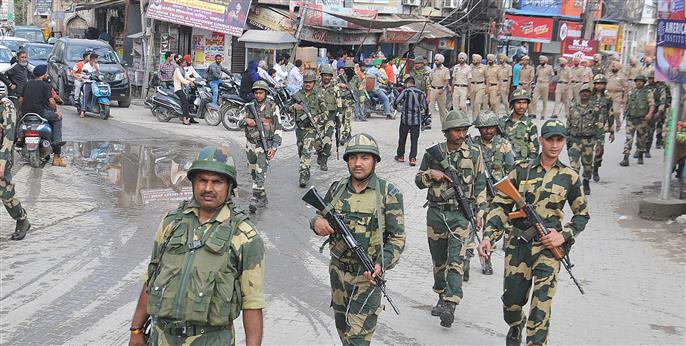
The head of Waris Punjab De – Amritpal Singh became a practising Sikh only recently and has been campaigning stridently for Khalistan. Some of his followers attacked a police station where one of their associates was being held.
Indeed, freedom of speech or discussion should be a fundamental right, but if he or any of his followers have broken the law, then the Indian authorities are within their rights to pursue and investigate them for alleged criminal behaviour.
However, instead learning from Indira Gandhi’s action against Sikhs to boost her standing with a bigoted majority, the government has cynically ordered the clamp down against all Sikhs in Punjab. Indian authorities have been arresting and raiding the homes of human rights activists, with internet blackouts, social media crackdowns, and misinformation being spread across national news by pro-Modi media. Twitter accounts of prominent Sikhs overseas (including politicians in Canada) highlighting India’s record of human rights violations as well as the state’s current clampdown have been censored in India. Respected Indian journalists have also been censored, with the Asia Desk of the Committee to Protect Journalists raising their plight, and journalists overseas have been sent threatening messages for daring to talk about what’s happening.
The state has invoked Section 144 of the Indian Code of Criminal Procedure to reduce gatherings in parts of Punjab, of four or more people and threatening its citizens with charges of rioting if this code is broken. These are draconian measures, which only serve to tarnish India’s reputation as the ‘world’s largest democracy’. Needless to say there have been mass arrests.
No reason has been given for why these draconian measures have been implemented, whilst concerns are of course amplified by India’s reputation of conducting torture, extrajudicial killings, and fake encounters. The collective memory of ‘Operation Woodrose’ post 1984, which targeted many thousands of innocent youth and civilians in Punjab under the pretext of quelling Sikh ‘militancy’ is etched in the psyche of Sikhs worldwide. We only have to look in the rear-view mirror of history to understand why Sikhs are fearful.
Many Sikhs abroad have family and friends in Punjab and fear for their safety and wellbeing. The suspension of civil liberties in a nation which prides itself on being a democracy, isn’t just a threat to the people of Punjab, but to democracy itself.
In the beginning of 1984, the Congress government was trailing badly in the opinion polls, yet went on to win a record majority as a result of its appeal to majority bigotry. The BJP is hoping that it will reap a similar dividend in next year’s election.
A word on Khalistan
Why would Sikhs living peacefully in India want a separate state? The issue did not arise until the increasing discrimination against Sikhs culminating in the genocide of 1984.
In 1984, we all shouted Khalistan, as a shorthand way of saying, ‘we hate the action of the Indian government’. Today some are saying it again following recent action in Punjab. The reality is that a separate religious state, like Pakistan, giving Sikhs controlling power, is not only geographically impossible but also against the teachings of the Gurus who taught equal rights for all. Khalistan is a place where Sikh values of equal treatment for all human beings – justice, compassion, and selfless service prevail.
The Khalistan we must strive for is the spread of these values throughout India and further afield.
[Ends]
Network of Sikh Organisations

